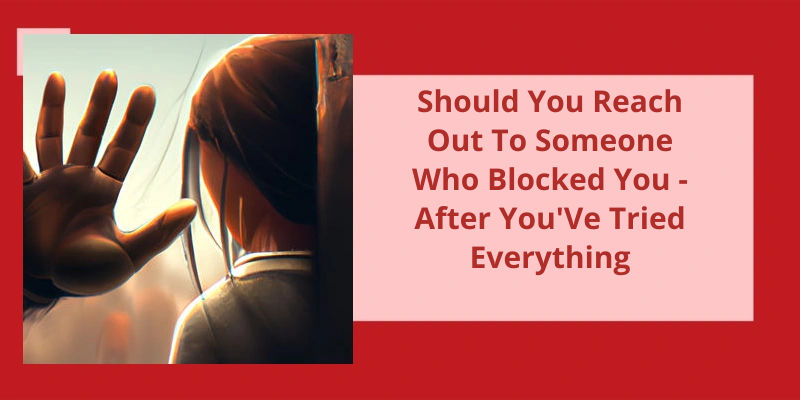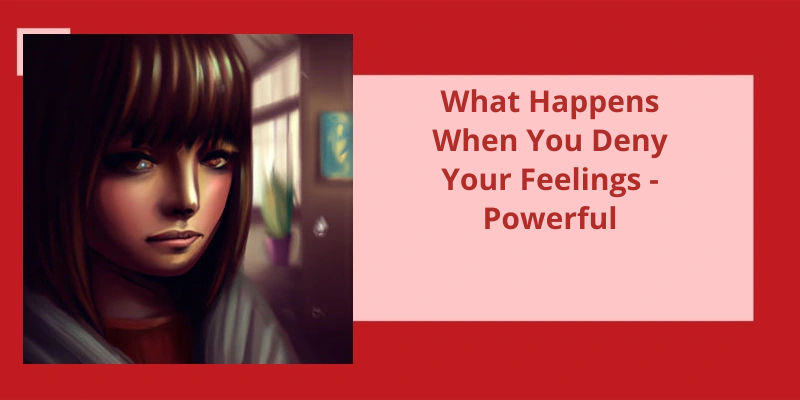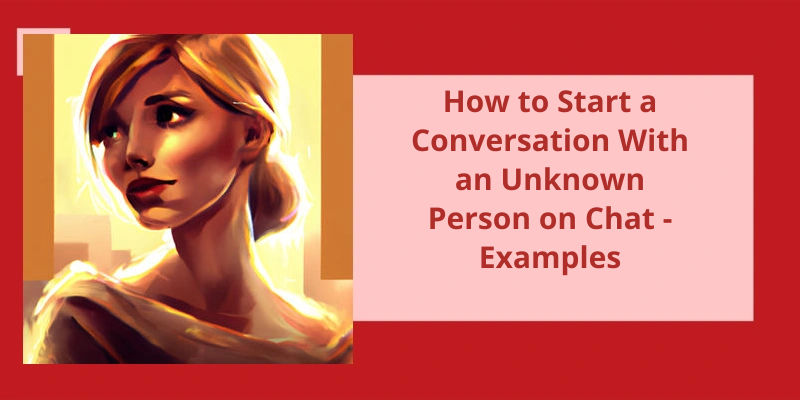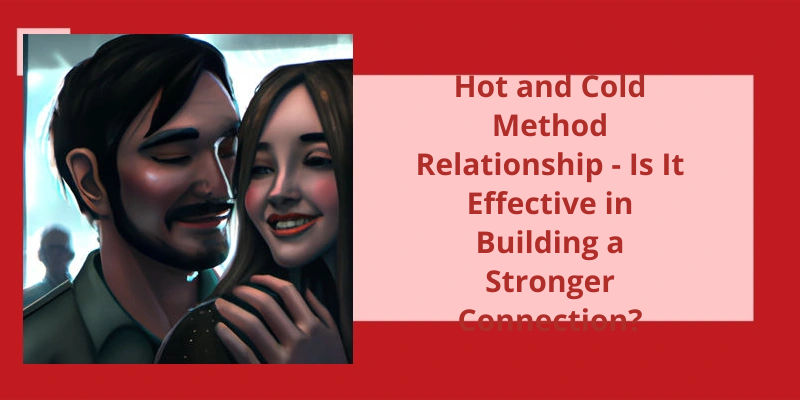The act of being blocked by someone can be disheartening and confusing, leaving you with a deep desire to reconnect and resolve the issues at hand. While reaching out to someone who’s blocked you may seem counterintuitive, it ultimately depends on the circumstances surrounding the block and the extent to which it’s impacted your relationship. If the block is limited to one or two social media platforms, chances are the person has chosen to cut off contact because they require some space and time to process their thoughts and emotions. In such cases, it can be beneficial to respect their decision and refrain from reaching out until an appropriate period of no contact has elapsed. However, if the block is more extensive, encompassing multiple forms of communication and interactions, it may suggest a deeper issue or prolonged animosity between the two parties. Under these circumstances, it’s crucial to evaluate the reasons why the block occurred in the first place and to consider alternative methods of resolving the conflict. In most cases, it’s advisable to avoid retaliating with a block of your own, as this will only perpetuate the cycle of negative communication. Instead, focus on personal growth, healing, and reflecting on the situation at hand. Reaching out should only be considered if it’s an absolute necessity or in the case of an emergency.
Should I Try to Contact Him if He Blocked Me?
When someone blocks you, it’s a clear indication that they want nothing to do with you. It signals a desire for distance and detachment from the relationship or interaction. It’s essential to respect their decision and the boundaries they’ve set. Going against their wishes and attempting to contact them can create further pain and frustration for you.
It’s important to remember that people have the right to choose who they want to communicate with and who they want to keep in their lives. Trying to reach out to someone who’s blocked you may lead to a sense of desperation and powerlessness. It’s better to focus your energy on healing and moving forward rather than clinging to a connection that’s been severed.
Instead of reaching out, it’s more productive to focus on personal growth and self-reflection. Reflect on the reasons behind the block and consider what you can learn from the experience. Use this as an opportunity for self-improvement and self-discovery. Give yourself space and time to heal from any emotional wounds that may have resulted from the block.
In some cases, if the person truly wants to reconnect with you or mend the relationship, they’ll find a way to contact you again. However, it’s crucial not to cling to false hope or obsess over the possibility of reconciliation. Allow things to unfold naturally, and if they choose to initiate contact, consider their motivations and intentions before deciding how to proceed. Remember that you deserve healthy and mutually respectful connections in your life.
However, there are other indicators as well that can help you determine if someone has blocked your number. Look out for a single ring or straight-to-voicemail calls, repeated busy tones, or a lack of online presence on messaging platforms. These subtle signs can provide further confirmation if you suspect that your number has been blocked.
How Can You Tell if Someone Has Blocked Your Number?
If you suspect that someone has blocked your number, there are a few signs you can look for to confirm your suspicions. One of the easiest ways to test this situation is to leave a voicemail and wait for a response. If youve been blocked, the recipient won’t receive a notification and won’t be able to respond to your message. Therefore, if you don’t receive a returned call or text message within a few days, theres a good chance you may be blocked.
Another clue that you may have been blocked is the sudden absence of any communication from the person in question. If you used to have regular contact through phone calls, texts, or social media messages, but now theres complete silence, it could be a red flag. It’s essential to consider other possible reasons for the lack of communication, such as a busy schedule or personal difficulties they might be facing. However, if the silence persists despite your attempts to reach out, blocking could be a probable explanation.
Furthermore, if your calls go directly to voicemail every time you try to contact someone, it could indicate that youve been blocked. Typically, when you call someone and it rings a few times before going to voicemail, it suggests that they may be unavailable or unable to answer the call.
On social media platforms, being blocked can be more difficult to determine. For instance, if you can no longer find their profile in search results, or if youre unable to see their posts or comments on mutual friends pages, it’s possible that youve been blocked.
If your attempts to contact someone are consistently met with silence and you suspect you’ve been blocked, there are a few signs you can look for to confirm your suspicions. On social media, the inability to find the persons profile or see their activity on mutual friends pages might also indicate a block. However, it’s important to keep in mind that these signs aren’t foolproof and could have other explanations as well.
It can be frustrating when you’re unable to reach out to someone who’s blocked you on all platforms. However, there are a few methods you can try to contact them despite the block. It’s important to proceed with caution and respect their boundaries. Let’s explore some possible solutions to help you reconnect in a respectful manner.
How Do You Contact Someone Who Blocked You on Everything?
Reaching out to someone who’s blocked you on everything can be a sensitive and challenging situation. When all traditional methods fail, there are a few alternative ways you can still attempt to contact them. One option is to use a different phone, whether it’s a friends or a family members. By doing so, you can bypass the block and have a chance to communicate with the individual.
Another method you can try is dialing *67 before entering the blocked persons number. This will hide your caller ID, making it less likely for them to recognize your call. However, keep in mind that this tactic might be seen as intrusive or manipulative, so use it with caution and respect the other persons boundaries.
There are apps and services available that allow you to change your caller ID to a different phone number. By using such tools, you can create the perception that you’re someone else entirely, increasing the chances of your call being answered.
Alternatively, you could download a burner app that provides temporary phone numbers. These numbers can be used to make calls and send messages without disclosing your actual identity to the blocked person. Burner apps offer a level of anonymity and can be useful in situations where youre desperately trying to establish contact.
In certain situations, changing your phone number might be necessary if you want to reconnect with someone who blocked you. This drastic measure allows you to start a fresh attempt at communication without any previous barriers. However, changing your number should be considered as a last resort, as it can inconvenience you and potentially disrupt your personal and professional connections.
Interpreting and Understanding the Reasons Behind Being Blocked
Being blocked by someone can be a hurtful and confusing experience. It’s natural to want to understand the reasons behind their actions and figure out if there’s any way to mend the relationship. However, before reaching out to someone who’s blocked you, it’s important to consider a few things.
Firstly, it’s crucial to respect the other person’s boundaries. Blocking is often a clear sign that they want to disengage from the relationship and maintain distance. Attempting to contact them again without their consent may only worsen the situation and further damage the trust between you.
Secondly, take some time to reflect on your own behavior and actions. Sometimes being blocked can be a result of miscommunications, misunderstandings, or unintentional hurt caused by our own words or behavior. Reflecting on any past conflicts or disagreements can help you gain insight into what led to the block and give you the opportunity to learn and grow from the experience.
Ultimately, whether or not to reach out to someone who’s blocked you is a personal decision. However, it’s essential to prioritize respect for the other person’s boundaries and consider your own role in the situation. If you genuinely believe there’s a chance for reconciliation, it may be worth approaching the situation with humility and a sincere desire to listen and understand. Communication and open dialogue can sometimes pave the way for forgiveness and healing.
In such cases, it’s possible that the person blocking you wants you to notice their absence or absence of communication. It could be an attempt to elicit a reaction or spark curiosity, causing you to reach out to them and initiate a conversation. However, this behavior can also stem from other motivations or misunderstandings, making it essential to consider the context and communication patterns between you and the person involved.
Why Would Someone Suddenly Block You?
Why would someone suddenly block you? Usually, when a person blocks you, they don’t want to speak or interact with you. It’s a clear sign of wanting to cut off all communication and distance themselves from you. While this is the typical implication of getting blocked, it’s essential to consider that peoples motivations can vary. In some rare cases, he might have used the block button as a means to get your attention or provoke a reaction from you. It could be a desperate move to elicit a response from you, hoping that you’d reach out and show that you care.
There could be various reasons why someone would resort to such extreme measures. Perhaps they felt ignored or unimportant, and blocking you was their way of asserting control or establishing boundaries. They might also be dealing with personal issues or emotional turmoil that they don’t want to burden you with, leading them to push you away through blocking. Alternatively, they could have misunderstood something you said or did, and instead of openly discussing their concerns, opted to block you as a means of avoiding conflict.
In some cases, being blocked might be an act of self-preservation. It’s crucial to reflect on your past interactions and consider whether any of your words or actions might have inadvertently contributed to their decision.
Ultimately, whether or not you should reach out to someone who’s blocked you depends on the circumstances and your individual relationship with them. It’s essential to respect their boundaries and give them the space they seem to be seeking. However, if you genuinely care about mending the relationship and believe that open communication is possible, it might be worth reaching out in a respectful and non-confrontational manner. Just be prepared for the possibility of rejection or further distance, and be mindful of their emotional well-being throughout the process.
Signs of Toxic or Unhealthy Communication Patterns That May Lead to Someone Blocking You.
- Constantly interrupting or talking over the other person
- Using insults, derogatory language, or personal attacks
- Ignoring or dismissing the other person’s feelings or opinions
- Refusing to listen or consider the other person’s perspective
- Excessive criticism or nitpicking
- Playing the blame game instead of taking responsibility for one’s actions
- Using manipulative tactics or gaslighting to make the other person doubt themselves
- Frequently crossing boundaries without remorse
- Displaying a lack of empathy or compassion
- Engaging in passive-aggressive behavior
- Constantly looking for ways to argue or create conflict
- Failing to communicate openly and honestly
- Engaging in stonewalling or refusing to engage in productive conversations
- Using silent treatment or ghosting as a means of control
- Displaying a pattern of inconsistency or unpredictability in communication
- Dismissing the other person’s need for space or alone time
Source: Why would someone block me for no reason?..
In situations where communication has come to a standstill due to being blocked, finding alternative ways to reach out to someone becomes crucial. While various methods may come to mind, one simplistic approach is to utilize a different phone to initiate a call. Unlike online platforms or messaging apps, phones don’t possess the capability to restrict individuals based on their identity. Rather, they primarily rely on blocking specific numbers. By employing an alternate device for communication, one can potentially reestablish contact and prompt a response from the person who’s previously blocked them.
How Do You Reach Out to Someone Who Has Blocked You?
If youve tried everything and still want to reach out to someone who’s blocked you, there are a few options to consider. One of the simplest methods is to use a different phone to call the person who blocked you. Phones themselves don’t have the capability to block people, as they’re unable to determine who’s on the other end of the line. In most cases, blocking is done by specific numbers, so using a different phone should allow you to bypass the block.
Another possible approach is to use a different messaging platform or social media account to connect with the person. If youve been blocked on one platform, they may still be accessible on another. By finding an alternate way to communicate, you can attempt to reach out and resolve any issues or misunderstandings that led to the block.
It’s important to remember that reaching out to someone who’s blocked you can be a delicate situation, and it’s crucial to approach it with respect and caution. Consider the reasons why you were blocked in the first place and reflect on your behavior. If you genuinely believe that there’s a chance to reconcile or resolve any conflicts, you can try sending a polite and sincere message expressing your intentions.
However, it’s important to be prepared for the possibility of rejection or no response. Blocks are often put in place for a reason, and the person who blocked you may not be interested in reconnecting. Respecting their decision is essential and pushing too hard may worsen the situation. It’s crucial to be mindful of boundaries and to prioritize the other persons feelings and comfort levels.
In some cases, it may be more appropriate to seek professional advice or mediation to address any issues or conflicts that led to the block. A trained therapist or counselor can provide guidance and support in navigating difficult interpersonal situations.
How to Recognize and Reflect on Your Own Behavior That May Have Led to Being Blocked
If you find yourself in a situation where someone has blocked you, it’s important to reflect on your own behavior before deciding whether or not to reach out to them again. Take some time to consider how your actions may have contributed to the block and if there are any patterns or behaviors that you need to address.
Ask yourself if you may have crossed boundaries, been disrespectful, or hurtful towards the person. Take responsibility for your actions and genuinely reflect on how you can avoid those behaviors in the future.
Reaching out to someone who’s blocked you can be a difficult decision to make. Before doing so, consider if you’ve genuinely apologized, shown remorse, and made efforts to change your behavior. If you haven’t already done these things, it would be worth taking the time to do so before attempting to contact them again.
Remember that everyone has the right to set boundaries and prioritize their own well-being. If someone has chosen to block you, it’s important to respect their decision and give them the space they need. Instead of focusing solely on repairing the relationship, turn your attention towards personal growth and self-improvement.
Ultimately, whether or not to reach out to someone who’s blocked you is a personal decision. However, it’s crucial to examine your own actions and take responsibility for any negative behavior that may have led to the block. By doing so, you can learn and grow from the experience, regardless of the outcome.
Remember that you’ve the right to control your online experience and protect yourself from negativity or harmful interactions. Blocking someone is a personal choice and, when done for valid reasons, shouldn’t be considered rude. It’s essential to prioritize your mental well-being and not let the opinions of others dictate your actions.
Is It Rude if Someone Blocks You?
In the digital age, it isn’t uncommon for friction to arise in online interactions. Whether it be on social media platforms, messaging apps, or even through email, disagreements and misunderstandings can occur. In some cases, this may lead to one person deciding to block another. But is it rude if someone blocks you? The answer depends on the context.
Overall, the act of blocking itself isn’t inherently rude. It’s often a means of self-preservation or asserting personal boundaries in the virtual realm. People may choose to block others due to harassment, offensive behavior, or even to distance themselves from toxic relationships. If you find yourself on the receiving end of a block, it’s important to remember that you may have unknowingly crossed a line or caused discomfort to the other person.
However, it’s crucial to differentiate between justifiable reasons for being blocked and instances where it may seem rude. If you’ve been blocked for no reason or due to trivial matters, it can indeed be perceived as disrespectful. In such cases, reaching out to the person who blocked you to seek clarification or discuss the issue may be a reasonable approach, as long as it’s done respectfully and with genuine intentions to resolve any potential conflict.
On the flip side, if you find yourself contemplating whether to reach out to someone who’s blocked you after trying everything, it’s essential to assess the situation carefully. Consider whether your attempts to resolve the issue have been respectful and reasonable. Reflect on the underlying reasons for the block and evaluate if reaching out again would truly serve a purpose or potentially exacerbate the situation.
It’s important to remember that everyone has their own boundaries and reasons for blocking others. Respect those boundaries and understand that pressing the issue may only intensify tensions. Accept that not all conflicts can be resolved, and sometimes it’s best to move on and redirect your energy towards positive interactions and relationships.
The act of blocking is often a method for individuals to protect themselves or assert personal boundaries online.
Understanding the Different Reasons People Choose to Block Others Online
- Personal preferences and values
- Protection from harassment and cyberbullying
- Privacy concerns and wanting to control who’s access to their content
- Disagreements and conflicts in online discussions
- Preventing unwanted advances or inappropriate behavior
- Maintaining a positive and safe online environment
- Reducing exposure to spam or unwanted messages
- Avoiding toxic or negative individuals
- Filtering out offensive or triggering content
- Blocking known scammers or bots
Conclusion
Understanding the reasons behind their action is crucial. If they’ve blocked you on only a few social media platforms, it’s likely they need some space and time to process whatever led to the block. In such cases, it may be appropriate to wait for a period of No Contact before reaching out, ensuring that you approach them with sensitivity and respect. However, it’s important not to retaliate by blocking them back, as it may escalate the situation further. Only in exceptional circumstances, such as an emergency, should you consider contacting them. Ultimately, it’s essential to prioritize their boundaries and emotions while making a decision that will enable the possibility of a healthy future interaction.






